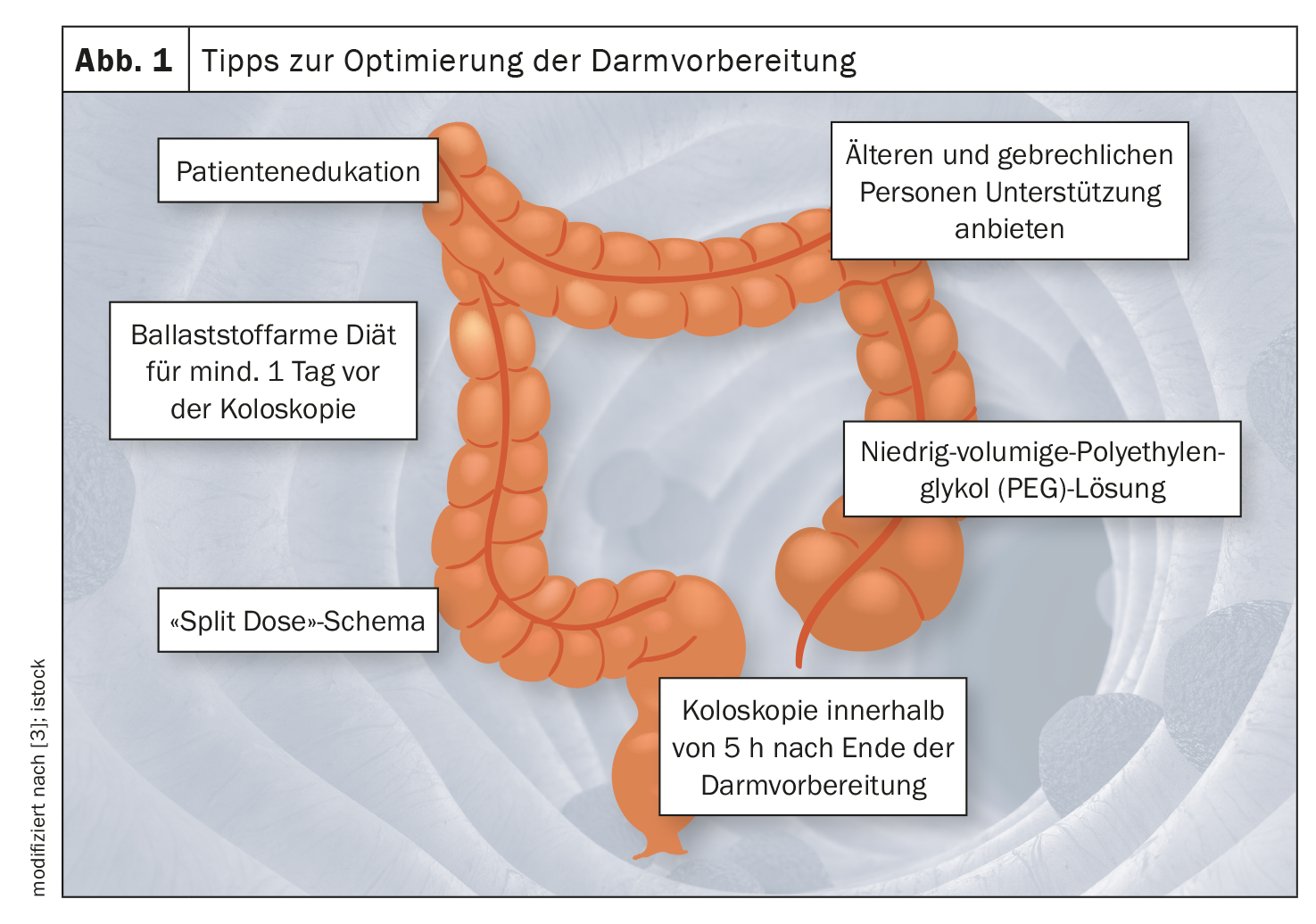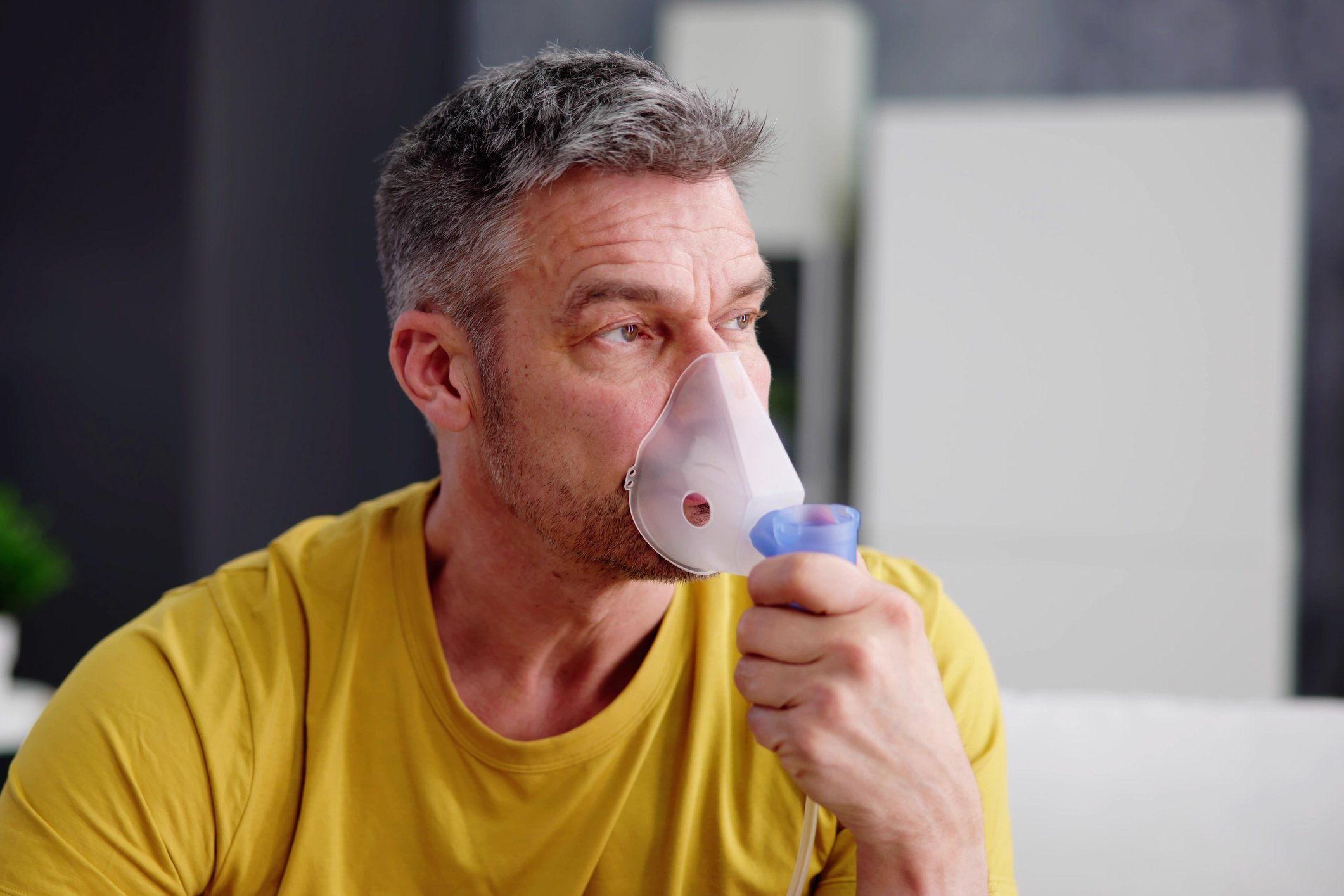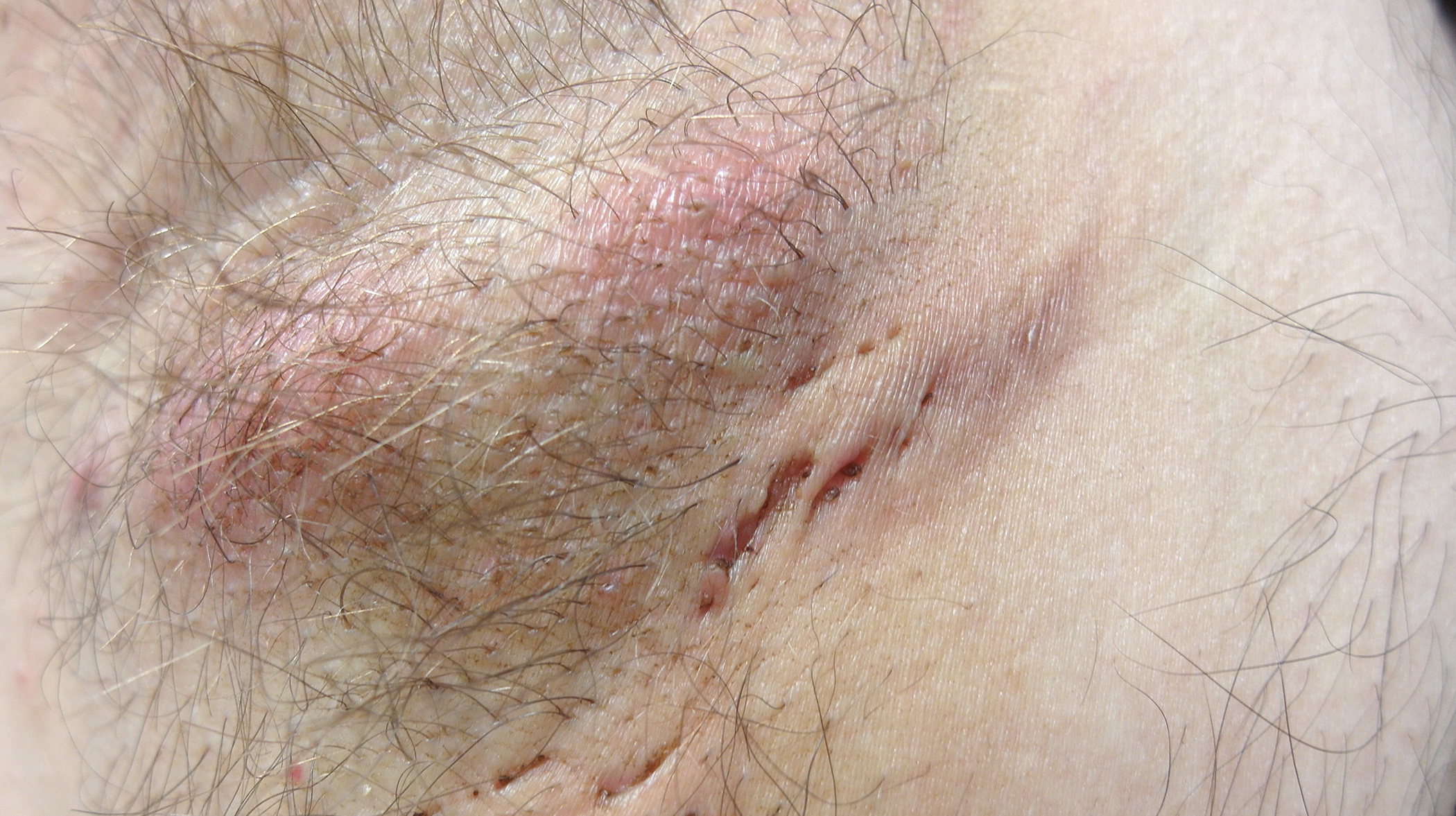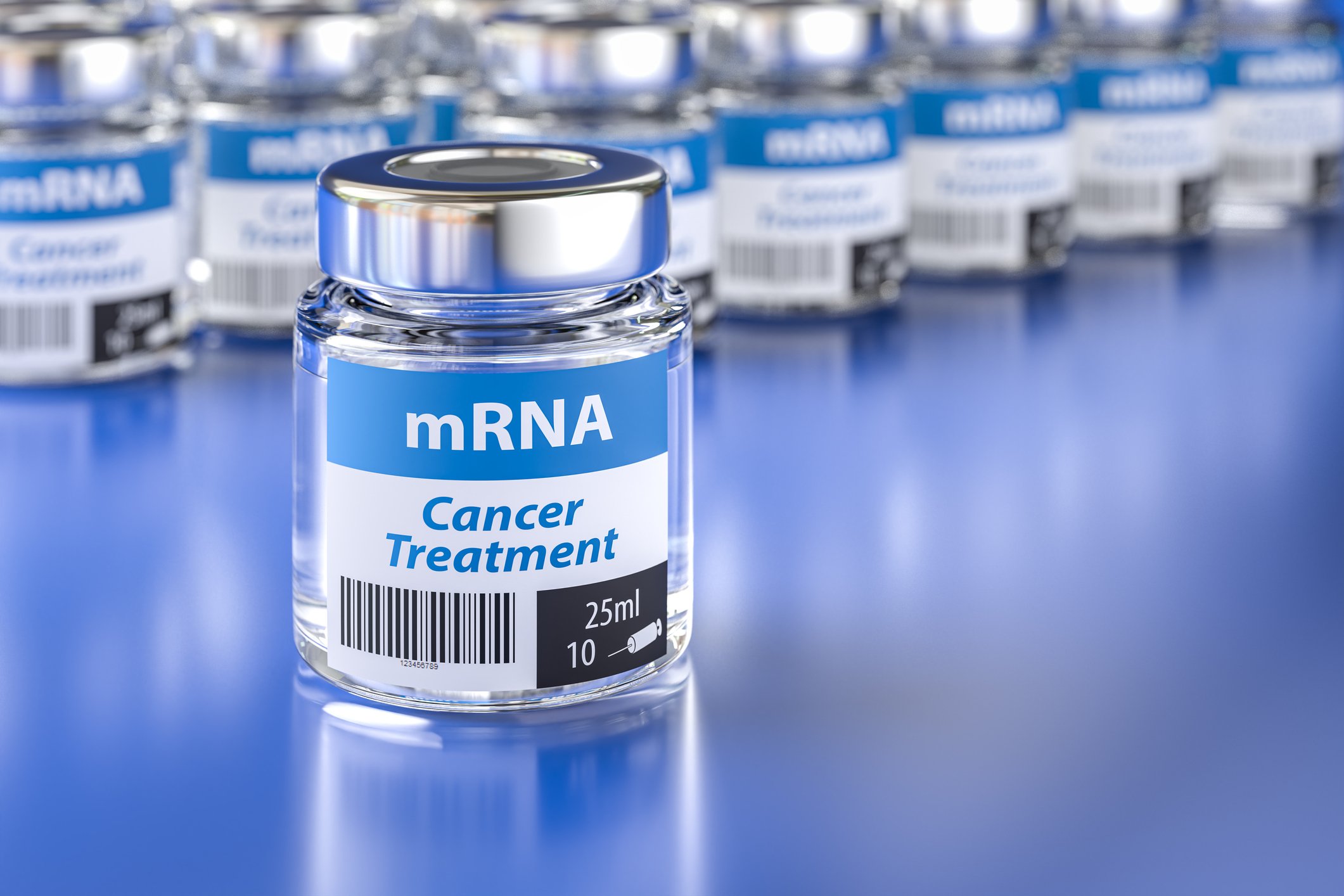Colorectal carcinoma is one of the most common malignant diseases worldwide. Colorectal cancer screenings play an important role in secondary prevention. Polyethylene glycol (PEG)-based solutions have been a proven means of intestinal cleansing for many years. Several meta-analyses have shown that a two-part administration of the laxative (“split dose”) is more beneficial than a one-part intake.
The lifetime risk of developing colorectal cancer corresponds to a probability of around 5 percent [1]. Patients in whom a tumor is detected in UICC (Union Internationale Contre le Cancer) stage I have a 5-year survival rate of 90% [2]. Colonoscopy is currently considered the gold standard in colorectal cancer screening, whereby effective bowel cleansing is a decisive factor for the quality of the colonoscopy, as diagnostic accuracy and adenoma detection depend on it [3]. A frequently used laxative solution recommended in guidelines is a polyethylene glycol (PEG) solution enriched with electrolytes [7]. The osmotic effect of the PEG solution leads to the binding of water, which collects in the colon. The resulting increase in stool volume leads to increased colonic contraction and accelerated bowel evacuation. The addition of electrolytes prevents fluid and electrolyte imbalances during laxation [7]. In addition to the choice of laxative and the timing of administration, patient education appears to play a decisive role. In this context, an individualized diet plan is recommended for four days before the colonoscopy [11].
Large evidence base underpins advantages of a split-dose scheme
A meta-analysis published in 2015 showed that taking the laxative solution spread over two days more than doubled the rate of successful bowel preparation compared to taking it once (OR 2.51; 95% CI 1.46-4.63) [4]. Two meta-analyses published in 2018 and 2022 also show that split dosing is beneficial in terms of the quality of bowel cleansing and is also generally preferred by patients [5,6]. One explanation for the superiority of the splitting regime is that the time between taking the last dose of the laxative and the colonoscopy is shortened with two-part administration. Bucci et al. included 29 RCTs in a meta-analysis comparing split and day-before regimens and found that the best results were achieved with colon cleansing according to the split-dose regimen if the colonoscopy was performed within three hours of the last dose; if this time interval exceeded five hours, the two dosing regimens no longer differed significantly.
| Colonoscopy screening reduces the risk of colorectal cancer |
| In Europe, the incidence and mortality of colorectal cancer is decreasing, which is largely attributed to the introduction of screening programs [8]. A colonoscopy is the most important examination for the detection of polyps and early detection of colorectal cancer. |
| A large study showed that in countries that introduced early detection programs with primary colonoscopy screening before the year 2000 (e.g. Germany, Austria or the Czech Republic), particularly sharp declines were recorded [9]. |
| In Switzerland, the costs of colorectal cancer screening for people aged 50 to 69 are covered by compulsory health insurance [10]. |
Literature:
- Balch C, et al.: The epigenomics of embryonic pathway signaling in colorectal cancer (Artikel). Front Pharmacol 2017; 8: 267.
- Riemann JF, et al.: Gastroenterologie in Klinik und Praxis. Band 1: I Intestinum: 6 Dünn- und Dickdarm. 6.17 Prävention und Früherkennung des kolorektalen Karzinoms, Thieme 2008.
- Shahini E, et al.: Factors affecting the quality of bowel preparation for colonoscopy in hard-to-prepare patients: Evidence from the literature. World J Gastroenterol 2023; 29(11): 1685–1707.
- Martel M, et al.: Split-Dose Preparations Are Superior to Day-Before Bowel Cleansing Regimens: A Meta-analysis. Gastroenterology 2015; 149(1): 79–88.
- Avalos DJ, et al.: Bowel Preparations Administered the Morning of Colonoscopy Provide Similar Efficacy to a Split Dose Regimen: A Meta Analysis. J Clin Gastroenterol 2018; 52: 859–868.
- Pan H, et al.: Same-day single-dose vs large-volume split-dose regimens of polyethylene glycol for bowel preparation: A systematic review and meta-analysis. World J Clin Cases 2022; 10: 7844–7858
- ASGE Standards of practice Committee; Saltzman JR, et al.: Bowel preparation before colonoscopy. Gastrointest Endosc 2015; 81: 781–794.
- United European Gastroenterology: Coordinating European action against colorectal cancer. 2022.
- Cardoso R, et al.: Colorectal cancer incidence, mortality, and stage distribution in European countries in the colorectal cancer screening era: an international population-based study. Lancet Oncol 2021; 22: 1002–1013.
- Krebsliga Schweiz, www.krebsliga.ch,(last accessed 08.11.2023)
- Adamek HE, et al.: Koloskopievorbereitung bei Patienten mit Diabetes mellitus: Entwicklung einer Handlungsempfehlung. Z Gastroenterol 2022; 60(05): 784–789.
- Bucci C, et al.: Optimal bowel cleansing for colonoscopy: split the dose! A series of meta-analyses of controlled studies. Gastrointest Endosc 2014; 80(4): 566–576.e2.
HAUSARZT PRAXIS 2023; 18(11): 16
GASTROENTEROLOGIE PRAXIS 2023: 1(2): 35











